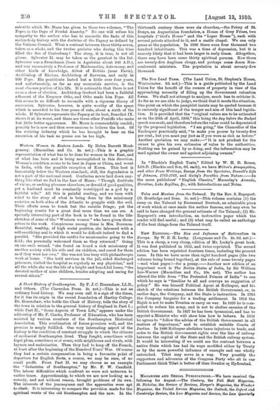NEw Eprnosss. — The Rise and Influence of Rationalism in Europe. By
W. E. H. Lecky. (Longmans and Co. 2s. 6d. net.)— This is a cheap, a very cheap, edition of Mr. Lecky's great book. It was first published in 1835, and twice reprinted. The second edition has been reprinted fourteen times, including the present issue. In this we have more than eight hundred pages (the two volumes being bound together), at the rate of some twenty pages —and what pages !—for a penny.—Another new edition of an important work is The Native States of India, by Sir William Lee-Warner (Macmillan and Co., 10s. net). The author has altered the title from "The Protected Princes of India" to one which he says is "familiar to all and conveys no suggestion of policy." He was himself Political Agent at Kolhapur, and his sketch of the relations between the British Government, or, in earlier days, the Company, and the State is instructive. In 1763 the Company bargains for a trading settlement. In 1812 the Rajah is not to make Treaties or carry on war. In 1825 he is com- pelled to reduce his army, and is not to shelter enemies of the British Government. In 1827 he has been tyrannical, and has to appoint a Minister who will show him how to behave. In 1832 he agrees to "follow the advice of the British Government in all matters of importance," and to establish suitable Courts of Justice. In 1886 Kolliapur abolishes taxes injurious to trade, and cedes to the British Government rights over the line of railway between the capital of the State and the British railway system. It would be interesting if we could see the contrast between a native State which has had its ways modified either by Treaty or by the more powerful influence of example and one wholly untouched. Tibet may serve in a way. Very possibly the supporters and advocates of the Congress Party who sit in our Parliament think Tibet is better off than Gwalior of Hyderabad.






































 Previous page
Previous page